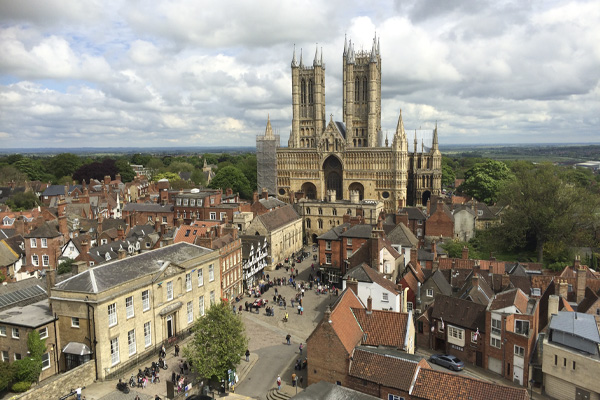Why Choose Lincoln
Join a community of researchers and practitioners
Visit cultural and heritage attractions
Hear from expert industry speakers
Combine research with extensive practical experience
Participate in real-world projects

Brayford Pool
September 2025
1 year
2 years
MA Cultural Heritage Management aims to enhance students' knowledge of the demands of leadership in the cultural heritage sector. These include broadening the appeal of attractions and collections; anticipating sector-wide trends, nationally and internationally; exploring the possibilities of digital cultural heritage; and understanding visitors and users more effectively. A strong theme of social justice runs through the programme.
Academics who teach on the programme combine research insights with extensive practical experience, contributing business, social science, and humanities insights to the course. Students benefit from the close links we have developed to cultural heritage sites of major importance
During the programme, students may benefit from external guest lectures delivered by experienced practitioners, participate in study visits to cultural and heritage attractions, and participate in live projects that aim to provide hands-on applications of classroom-based learning.
Join a community of researchers and practitioners
Visit cultural and heritage attractions
Hear from expert industry speakers
Combine research with extensive practical experience
Participate in real-world projects

The programme combines modules that examine cultural heritage management from the perspective of both users and heritage sites. As so much cultural heritage activity occurs within the context of tourism, there are also modules that link our sector to tourism and events, focusing on the important issue of sustainability.
In addition to the taught element of the programme, students are expected to complete a dissertation which encourages innovation and diverse pathways to the final award.
Each module typically consists of two weekly teaching hours over a teaching term of 12 weeks. Four modules are usually studied per semester. Part-time students will generally study two modules per term, equating to four hours of contact time per week. Hours of study may vary from term to term for both full and part-time students and can be spread throughout the week.
Postgraduate level study involves a significant proportion of independent study, exploring the material covered in lectures and seminars. As a general guide, for every hour spent in class, students are expected to spend four to five hours in independent study. For more detailed information please contact the Programme Leader.
† Some courses may offer optional modules. The availability of optional modules may vary from year to year and will be subject to minimum student numbers being achieved. This means that the availability of specific optional modules cannot be guaranteed. Optional module selection may also be affected by staff availability.
We want you to have all the information you need to make an informed decision on where and what you want to study. In addition to the information provided on this course page, our What You Need to Know page offers explanations on key topics including programme validation/revalidation, additional costs, contact hours, and our return to face-to-face teaching.
There is a wide variety of assessment types, tailored to the content of the module. Examples include blogposts, consultancy reports, building surveys, visitor audits, a record of digitising a collection and more traditional essays. These are designed to develop skills needed for a career in cultural heritage institutions. There is a focus on group discussion in weekly class sessions, which enables students to receive feedback on their understanding of and approach to the subject matter.
Academics from MA Culture and Heritage Management are involved in Lincoln International Business School’s Visitor Economy Research Group (VERG). VERG aims to harness the research energies of a number of colleagues, both early career and well established, who are working in the areas of tourism, events, and leisure.
Explore Our Research
Students are eligible for membership of the Lincolnshire Heritage Students’ Forum, established in 2020. The Forum runs a lively seminar/discussion programme and connects students to heritage sites in the county, as well as to influential national leaders in the sector. It also offers a range of volunteering opportunities, which are both rewarding and offer valuable experience.
Students may also benefit from guest lectures delivered by experienced practitioners in the culture and heritage sectors.
Students can join the Heritage and Archives Network at the University of Lincoln, a forum which connects our community of researchers and practitioners, and the Lincolnshire Heritage Students’ Forum, which enables networking across heritage institutions in the county. They can also benefit from our partnership with the International Bomber Command Centre in Lincoln.
Students have the opportunity to participate in study visits to cultural and heritage attractions and can learn about preserving heritage materials for use in archives, museums, and exhibitions by participating in the creation of a digital archive.
Postgraduate Application Support
Applying for a postgraduate programme at Lincoln is easy. Find out more about the application process and what you'll need to complete on our How to Apply page. Here, you'll also be able to find out more about the entry requirements we accept and how to contact us for dedicated support during the process.
How to Apply
First or second class honours degree.
If you have studied outside of the UK, and are unsure whether your qualification meets the above requirements, please visit our country pages https://www.lincoln.ac.uk/studywithus/internationalstudents/entryrequirementsandyourcountry/ for information on equivalent qualifications.
Overseas students will be required to demonstrate English language proficiency equivalent to IELTS 6.0 overall, with a minimum of 5.5 in each element. For information regarding other English language qualifications we accept, please visit the English Requirements page https://www.lincoln.ac.uk/studywithus/internationalstudents/englishlanguagerequirementsandsupport/englishlanguagerequirements/.
If you do not meet the above IELTS requirements, you may be able to take part in one of our Pre-session English and Academic Study Skills courses. https://www.lincoln.ac.uk/studywithus/internationalstudents/englishlanguagerequirementsandsupport/pre-sessionalenglishandacademicstudyskills/ . These specialist courses are designed to help students meet the English language requirements for their intended programme of study.
You will need to have funding in place for your studies before you arrive at the University. Our fees vary depending on the course, mode of study, and whether you are a UK or international student. You can view the breakdown of fees for this programme below.
The University offers a range of merit-based, subject-specific, and country-focused scholarships for UK and international students. To help support students from outside of the UK, we offer a number of international scholarships which range from £1,000 up to the value of 50 per cent of tuition fees. For full details and information about eligibility, visit our scholarships and bursaries pages.
Postgraduate Funding Options
Find out more about the optional available to support your postgraduate study, from Master's Loans to scholarship opportunities. You can also find out more about how to pay your fees and access support from our helpful advisors.
Explore Funding Options
I was encouraged to think about things that wouldn’t otherwise have crossed my mind. It was really engaging from beginning to end and gave me the confidence to start my own heritage business.
Sue Johnstone
MA Cultural Heritage Management
Graduates of the MA Culture and Heritage Management have gone on to a variety of careers, including curatorial posts in specialist and county museums, setting up their own heritage businesses, and managing backstage operations at music festivals. Others have gone on to further study at PhD level.
For more information about this course, please contact the Programme Leader.
Mrs Natalie Brimecome-Mills
NBrimecomeMills@lincoln.ac.uk
Lincoln International Business School works with students and organisations to enhance the contribution of business to society. For students, that means developing their business skills and knowledge to improve their career readiness.The University of Lincoln is a member of AACSB, a global nonprofit association connecting educators, students, and businesses to achieve a common goal: to create the next generation of great leaders.
About the AACSB
To get a real feel for what it is like to study at the University of Lincoln, we hold a number of dedicated postgraduate events and activities throughout the year for you to take part in.
Upcoming Postgraduate Events